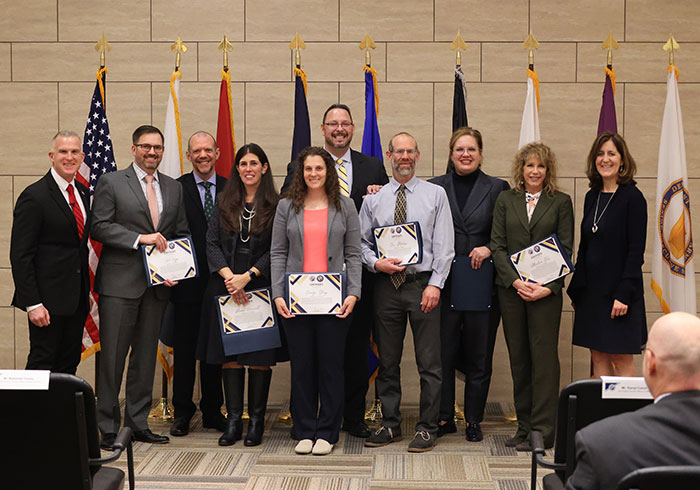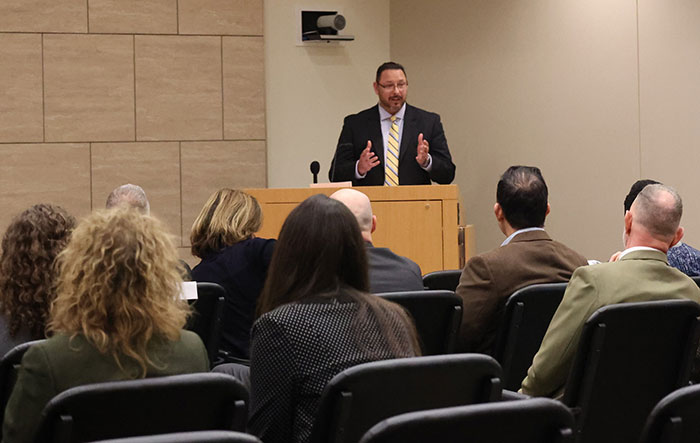Above and Beyond: SJA's Kelly Bids Farewell to 'Hidden Gem' MRDC

Jeremiah Kelly knows he sounds like a walking, talking cliché when he calls the U.S. Army Medical Research and Development Command his home, yet in his case that old bromide holds especially true. A local kid born and raised in Frederick, Kelly currently works chiefly as the head of MRDC's Regulatory Law Division in the Office of the Staff Judge Advocate, a position he alternately refers to as both "special" and "fulfilling." When he shuts off the light in his office for the final time on February 10, it will mark the end of a wildly successful 12-year run at MRDC.
"MRDC is a hidden gem," says Kelly, who is set to assume a position at a private legal firm in the coming weeks. "I am not kidding when I say that I have enjoyed every minute of supporting this mission."
The importance of that mission clearly took root at a young age. Kelly first started working at MRDC during his senior year at Frederick High School, when he began an internship with the Fort Detrick Environmental Office at the old U.S. Army Center for Environmental Health Research lab. From 1996 to 2001, he – in his own words – "helped clean fish tanks" at USACEHR while also working on the then-burgeoning Intelligent Aquatic Biomonitor System, which uses bluegill fish to help detect toxic substances in bodies of water. The iABS, which Kelly dutifully helped cart to several Environmental Protection Agency Superfund sites during his internship, would later go in to win a number of patents and, eventually, commercial licensing as well.
"It's hard to forget Jeremiah because he always had a lot of energy," says Mark Widder, a research biologist who worked with Jeremiah in the old USACEHR lab some 25 years ago. Widder started at MRDC himself in 1992 and remains at Fort Detrick to this day, still working as a key member of the fish lab several years after USACEHR was absorbed by the Walter Reed Army Institute of Research. "I remember that you'd give him a task for the week, and he'd try to get everything done in one day," says Widder, remarking on Kelly's outsize work ethic. "Some things were done correctly, and others not so much – I had to remind him that not everything in science can be accomplished in a day, but I always appreciated his enthusiasm."
Says Kelly, chuckling in response, "I owe a lot of my love and affection to the command from working on that project."
Upon returning to MRDC in 2011 to work in the SJA office, Kelly channeled his energy into aiding the command's medical product development efforts; his position being responsible for guiding mature (and potentially beneficial) products through the various legal processes and milestones required by the U.S. Food and Drug Administration for review, clearance and approval. Through this position, he and his staff buttressed the command's lifesaving work both during and after the Ebola Virus Disease outbreak in West Africa in 2014.

Kelly has also been integral to the passage and implementation of Public Law 115-92, a key legal statute which allows for enhanced engagement between the U.S. Department of Defense and the FDA. Notably, the measure grants expanded Emergency Use Authorization authority to the DOD. Perhaps more importantly however, it also established the Medical Product Acceleration Committee, a body which regularly reviews, along with FDA senior leadership, the DOD's highest medical product priorities for which the FDA's help is needed. The establishment of the MPAC is a substantial achievement that will continue to benefit the Warfighter by ensuring safe and effective medical products are approved, licensed or cleared by the FDA.
"Jeremiah's tireless efforts to organize the activities of both the DOD and FDA under PL 115-92 have established professional relationships most beneficial to both agencies and the Service Member," says Dr. Terry Rauch, Acting Deputy Assistant Secretary of Defense for Health Readiness Policy and Oversight, who calls Kelly an "instrumental" force in developing the statutory framework found within Public Law 115-92.
"Jeremiah has been our go-to person for all things requiring insight or legal support with the FDA and with regulatory requirements," says Dawn Rosarius, the Principal Assistant for Acquisition at USAMRDC, who estimates she's worked with Kelly for nearly 15 years. "During the pandemic, he worked countless hours and responded to requests in minutes to ensure that all of DOD had safe and efficacious products. He was one of the first people to join the COVID Additive Manufacturing Working Group to ensure receipt of any medical materiel met FDA requirements so they could safely protect, diagnose or treat our military and their beneficiaries."
Indeed, the pandemic granted Kelly's team the opportunity to have an impact beyond just MRDC. As Chief Coordinating Counsel for the Joint Program Executive Office for Chemical, Biological, Radiological and Nuclear Defense's Assisted Acquisition Legal Cell for Covid Response, Kelly and his team played a major role in executing $83 billion dollars in pandemic medical research, development and acquisition funding.
"While the pandemic response was a team effort, it's true that every team needs a strong leader, and Jeremiah was the right person in the right place at the right time for this team," says Joseph Strawn, USAMRDC's Staff Judge Advocate, who works alongside Kelly in the SJA office. "The fact that he was in this office during the pandemic was a great benefit to the command and the country too, quite frankly."
Says Kelly on the work of his team during the pandemic, "They touched every vaccine, every diagnostic and every personal protective equipment contract over the last three years. That's the kind of contribution that is enduring, that will be remembered long after [the legal team] is no longer here."
Kelly's focus now, in the waning days of his tenure, is on friends and colleagues, the familiar faces he's spent the past several years with – nearly twenty years total at MRDC when you combine both stints at the command. For him, it all runs back to the same mission he was drawn to back in high school days.
"The idea that there's an integrated command that develops products from bench-to-battlefield, from early-stage science and technology to advanced development, and then into FDA-approval and clearance, licensure and fielding – it's an incredibly powerful model that others emulate," says Kelly. "It's an incredible mission, and the MRDC team is incredibly good at it."
His affection for MRDC is so strong that Kelly is trying to ensure, even during his own departure, that the command's reputation for excellence lives on. According to Widder, Kelly recently went so far as to recommend a person to fill his old job at the fish lab: a student from one of the classes Kelly teaches at nearby Mount St. Mary's University. Notably, that person has since earned a contract research scientist position at the lab. It's the kind of ending only a guy like Jeremiah could deliver – certainly cyclical, almost perfect in a way. For him, it's all about doing right by the people who have done right by you for so long.
"It's bittersweet because you're leaving the people, and the people are what make MRDC so special," says Kelly. "But I have truly given everything I could to this job, and I can look back and be happy and proud of all the things we've accomplished as a team."
 An official website of the United States government
An official website of the United States government
 ) or https:// means you've safely connected to the .mil website. Share sensitive information only on official, secure websites.
) or https:// means you've safely connected to the .mil website. Share sensitive information only on official, secure websites.


